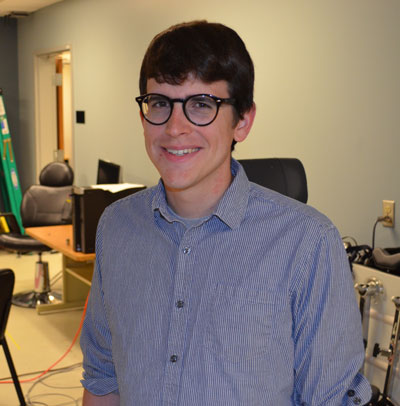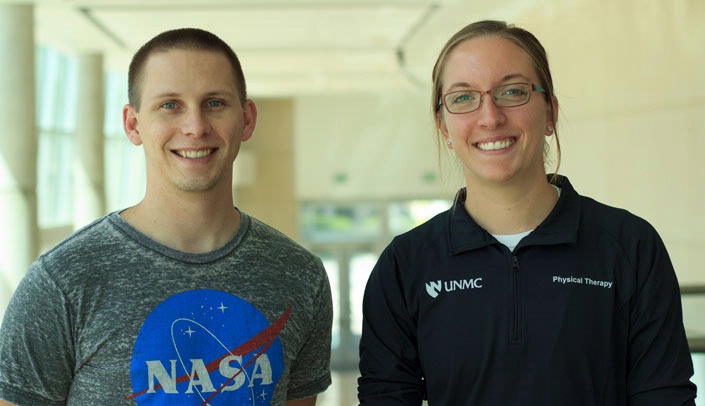Who says physical therapists aren’t rocket scientists? Just look at Trent Werner.
“I am in no way a rocket scientist,” Werner said.
 |
Jamie Gehringer |
Nope, too modest.
Werner, a physical therapy student in the College of Allied Health Professions, is a NASA Nebraska Fellow. He was recognized for his contribution to the research project of Chun-Kai Huang, Ph.D., a post-doctoral research associate in physical therapy education who has received funding from NASA to study how circadian rhythms can affect an individual’s ability to do motor tasks in space.
Werner said that’s a big deal in space, where astronauts aren’t living and working under Earth-like days and nights.
While Dr. Huang and his team can’t exactly mimic space conditions, they hope to send a protocol up to the International Space Station. The next step could be a prescription of exercises, or a training program astronauts could use.
“We’re trying to help NASA solve a problem, rather than just give them information,” Werner said.
Cool — but Werner isn’t even UNMC’s only physical therapist rocket scientist.
Melissa Parks is another physical therapy student and another NASA Nebraska Fellow. She’s helping conduct research at the Clinical Movement Analysis (C-MOVA) Lab, directed by her mentor, Joseph Siu, Ph.D., associate professor of physical therapy.
And at the Munroe-Meyer Institute’s physical therapy department, third-year Ph.D. student Jamie Gehringer is yet another UNMC NASA Nebraska Fellow.
Parks and the Siu lab are working to develop a new smartphone app for human motion analysis. We already have motion-analysis technology – but currently in expensive, permanent-lab settings.
“Mobile application could be used in small, rural clinics – or in confined spaces, like the International Space Station, for practical use in identifying biomechanical changes in the body,” Dr. Siu said.
Gehringer, working in the lab of Max Kurz, Ph.D., associate professor of MMI physical therapy, is looking at the effects of transcranial direct-current stimulation (TDCS) on brain activity.
Specifically, Gehringer studies how TDCS might affect brain responses associated with learning motor tasks.
“We know there’s an effect of microgravity on neuroplasticity in long-term stays in space. … So our idea was that we could look into the effects of TDCS on these neural populations, and then it could potentially be used as a medical strategy to reduce these degradation effects,” he said.

This is the coolest thing ever! Congrats to each of you!
Great work, everyone!
We are so glad to have you, Trent and Melissa, to be our DPT students who are pursuing research to improve astronants' health and impact lives in the future.